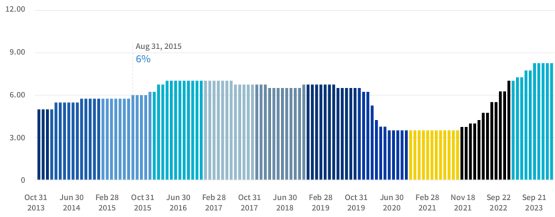The number of homeowners being forced to sell properties they had only bought two years prior has jumped from 2% of total sales in May last year to 3.7% a year later, according to research from Lightstone. This is an increase of more than 80%.
The information provider says “this suggests that many buyers took advantage of the low interest rates as the market provided relief during Covid, only to find they could not afford mortgage repayments as interest rates normalised”.
ADVERTISEMENT
CONTINUE READING BELOW
Read: You don’t qualify for bank assistance? Good, you’ve dodged a bullet [Apr 2020]
The prime interest rate hit a multi-decade low of 7% in 2020 during the Covid-19 pandemic and remained below 8% until May 2022. Successive sizeable rate hikes since then pushed prime to 11.75% in May this year.
An analysis by Moneyweb in May showed that repayments on a R1 million property (fully bonded) would’ve increased from R7 753 to R10 837 a month – this equates to a 40% jump. For households already under pressure from high fuel, electricity and food prices, to find another R3 000 a month is a massive ask. On a R2.5 million bond, the amount is nearly R8 000!
Read: How to cope with rate hikes and meet your bond repayment
Lightstone notes that the “exceptionally low interest rate environment from mid-2020 to end 2021 created an opportunity for new buyers to enter the market or for existing homeowners to buy up – but it also created the possibility of too many buyers overstretching themselves”.
Interest rate cycle
Source: Lightstone
Fewer buyers in the market, and they don’t want bonds
It is not as simple as measuring sales in execution notices, as these days, banks are avoiding this route as far as possible. Instead, Lightstone measured “property sales volumes, the number of properties bonded, and the number of sales within two years of purchase, to determine whether the number of distressed sales [is] rising or not”.
Read: Why consumers seldom win in legal battles against the banks
It says the volume of “residential purchases by natural persons (not companies or trusts) halved from May 2022 to May 2023, and only 40% of buyers bonded their properties in May 2023 compared to 60% in 2022. This tells us that there were less buyers in the market, and when they did buy, they were less likely to bond their purchases”.
It illustrates the point by saying there would’ve been 60 bonds for 100 sales in May 2022, but by May this year, there were just 20 bonds for 50 sales.
“Having established that volumes and bonds are down, Lightstone looked at how many buyers were selling properties within two years to measure the level of “distressed sales” and compared May 2022 with May 2023 – and found that 80% more of those who bought in the middle of the low interest period, May 2021, were sellers by May 2023.”
ADVERTISEMENT
CONTINUE READING BELOW
Read:
Evidence that banks sell repossessed houses for cents in the rand [Jan 2021]
Lawyers blocked from trying to side-step courts in selling repossessed homes [Mar 2022]
Evidence of repossessed homes sold for a pittance can be used in R60bn class action suit – court [Jul 2022]
FNB’s property barometer shows a similar trend, albeit not to the same extent as Lightstone’s data. It surveys estate agents around the country who categorise the reasons for sales.
The stress is most obvious in the lower middle-class market, at under R750 000. Here, the pressure was already evident a year ago.
| Downscaling due to financial pressure | Q1 2021 | Q1 2022 | Q3 2023 |
| Overall | 21% | 20% | 22.8% |
| Under R750k | 23% | 34% | 33.3%* |
| R750k to R1.6m | 22% | 18% | 21.1% |
| R1.6m to R2.6m | 21% | 18% | 23.5% |
* R500k-R750k
FNB says 23% of financial pressure-induced sales remain elevated – “higher than the historical average of 18% since 4Q 2007”.
“As expected, these are disproportionately higher in the affordable market segment, with an estimated 30% of sales attributed to financial pressure. This reflects the impact of the sharp increase in debt servicing costs, which should have a more pronounced impact on lower-income households”.
Listen to this episode of The Property Pod with Suren Naidoo (or read the transcript here):
You can also listen to this podcast on iono.fm here.
Download the free LiSTN audio app on Google Play, Apple or here.

